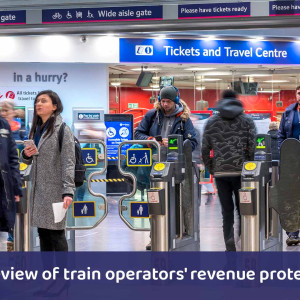Independent review of train operators’ revenue protection practices


Executive summary
Introduction
1. Fare evasion is a crime and costs Britain's railway hundreds of millions of pounds every year, denying train operators legitimate revenue and undermining fare-paying passengers' sense of fairness in the system. Less industry revenue means higher fares, higher taxpayer subsidy and less money for investment to improve services.
2. It is therefore right that there are measures in place to deter and hold to account those who deliberately evade their fare. However, it is vital that these are applied appropriately and fairly, and in a way that maintains trust in the system.
3. During 2024, the media reported on a number of cases of train operators appearing to take disproportionate action against passengers who, on the face of it, had made genuine errors with their tickets. This led, in some cases, to prosecution.
4. These cases involved individuals being penalised for seemingly unintentional or minor transgressions of fares and ticketing rules, including where:
- there was no possible revenue loss to the industry; and
- a rule had technically been broken, but the circumstances were such that the passenger's error appeared to have been made innocently and without them realising. For example, where the terms and conditions (T&Cs) of a railcard may not have been clear to a passenger when purchasing their ticket.
5. In addition, in August 2024, the Chief Magistrate quashed six fare evasion convictions that had been prosecuted incorrectly using the fast-track 'Single Justice Procedure' (SJP).
This then led to just over 59,000 similar convictions being quashed. While this was on the grounds of a specific procedural error by train operators (rather than a fundamental problem with the case for prosecution), it raised concerns about the oversight and assurance of the processes for prosecution within both the train operating companies (TOCs) involved and the court system.
6. In response, on 13 November 2024 the then Secretary of State for Transport commissioned[1] the Office of Rail and Road (ORR) to conduct an independent review of train operators' revenue protection practices. Her overriding priority in doing so was to ensure that fare evasion was being addressed, but in a way that was fair to passengers and in line with the correct procedures.
Background
7. There are a range of circumstances in which a passenger may innocently attempt to travel without a valid ticket for their journey.
For example, they may make a mistake during purchase, they may accidentally board the wrong train, they may misplace their ticket or leave their railcard at home.
8. However, many of these reasons can also be used as excuses by passengers who deliberately choose to underpay or avoid their fare. This creates a number of 'grey areas' where it can be difficult for rail staff to determine the passenger's intent and decide how to address the situation.
9. Making this more challenging is the railway's complex fares and ticketing framework. This has grown more complicated over time, with more features being added as the industry has responded to developments such as the introduction of mobile apps for ticket purchases, and has offered new ticket products to meet evolving passenger needs and expectations.
10. While this has provided a wide array of choice, it has also increased the scope for passenger confusion and error, with more options and T&Cs to understand. In the past, passengers were able to rely on the advice of booking office staff to get this right. But with around 60%[2] (source: Table 10, Ticket purchasing behaviour and preferences among rail passengers[3], DfT.
Research carried out in February and March 2023) of tickets now bought online or at ticket machines, there is now much greater onus on passengers themselves to navigate this.
11. The complexity and nature of the system has also increased the number of vulnerabilities available for fare evaders to exploit. In this context, as intent can be hard to determine, a passenger making an innocent mistake may be assumed to have acted deliberately.
12. The rail industry's ticketing rules impose a strict requirement on passengers to hold a valid ticket for their journey (with a few limited exceptions). Added to this, under railway byelaws, it is an offence not to be able to present a valid ticket for a journey - regardless of the passenger's intent.
This 'strict liability' framework makes the consequences for a passenger not holding a valid ticket potentially very serious.
13. This, and the challenge of verifying a passenger's true intention, can mean that disproportionate action can end up being taken against some passengers.
The passenger perspective
14. As part of our review, we issued a Call for Evidence inviting passengers to submit their experience of revenue protection practices.
We have included a number of quotes and case studies from this in our report and include some of these below to illustrate some of the reported outcomes that have arisen under the current system.
References
- ^ commissioned (www.orr.gov.uk)
- ^ around 60% (assets.publishing.service.gov.uk)
- ^ Ticket purchasing behaviour and preferences among rail passengers (assets.publishing.service.gov.uk)